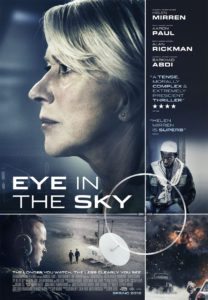 Have you seen Eye In The Sky, released earlier this year? It’s about a drone strike. One drone strike. Characters argue over whether to launch a missile or not to launch a missile, and that’s the entire movie, an hour and forty minutes, but it goes by so fast you won’t even notice. It’s tense from the start and doesn’t let up. It’s an impressive piece of film-making and worth watching.
Have you seen Eye In The Sky, released earlier this year? It’s about a drone strike. One drone strike. Characters argue over whether to launch a missile or not to launch a missile, and that’s the entire movie, an hour and forty minutes, but it goes by so fast you won’t even notice. It’s tense from the start and doesn’t let up. It’s an impressive piece of film-making and worth watching.
Come back when you’ve seen it.
Good, right? On the surface, without a doubt. Everything about it is solid, from the writing to the directing to the performances.
It’s not a standard issue war movie. It presents a moral question (technically known as the doctrine of double effect) and forces its characters to answer it, despite their best efforts not to. The level of buck-passing it displays is breathtaking. Its working title was The Kill Chain, referring to the chain of people the decision is passed upwards to.
But once it was over, I began to wonder. What message is the movie really sending? Why did they go about sending it the way they did? Is it simply asking a question? Or in its efforts to present a debatable situation is it in fact taking a side—a morally dodgy one?
Three high level terrorist targets, including a one-time British and a one-time American citizen, are in a house in Kenya, along with two suicide bombers slowly putting on jackets and filling them full of explosives. Outside the walls surrounding the house sits an adorable little girl selling bread. If a missile is launched, she will almost certainly be killed. If the bombers get away, they will almost certainly blow themselves up in a crowd, killing scores of people. What to do?
The decision to launch the missile is made. The bad people are blown up. The little girl dies.
In the end, only one woman continues to object to the killing of the girl. She makes a dig at the British General (Alan Rickman), who says he’s seen the aftermath of five suicide bombings, and never to tell a soldier that he doesn’t know the cost of war. She’s left in tears, realizing the hard choices Generals have to make.
This is all well and good. The movie shows us that war presents morally ambiguous choices no matter how it’s waged. In this case, at a great distance, using drones to fire missiles with pinpoint accuracy. No matter one’s decision, death will be the result. How much death and who’s going to die is what has to be decided.
Kubrick, when applying this logic to the possibility of nuclear warfare, concluded it was absurd. Debating options on the basis of ten million vs. twenty million dead is not sane. It’s madness. And so he made Dr. Strangelove.
Eye In The Sky is no comedy. The proposed death tolls are easy to comprehend. One little girl, probably a few bystanders besides, or two suicide bombers in a mall, blowing up an estimated eighty souls. What do to?
Deciding anyone has to die is awful. This is what the movie shows so well. Both options are terrible. But where I fear the movie becomes morally dodgy is in the scenario they set up. Because what answer could there be but one? If we’re talking one death vs. eighty, even if the one is a little girl, there’s only one answer: You save eighty lives at the cost of one. As presented in the movie, the decision seems to ably satisfy the doctrine of double effect.
So in that sense, the decision is clear, no matter how gut-wrenching. Who is going to take responsibility for making the decision is the issue. The military higher-ups, understanding that this is what war is, make the decision quickly. The politicians and the drone pilots are the ones who make matters difficult.
And we relate to them. Of course we do. There’s a little girl about to be blown up — a little girl we’ve seen hula-hooping! She’s adorable. Therein lies the tension. And yet, by the end of the movie, we understand what all of the characters understand: It has to be done.
It has to be done. War is hell. Bad guys are doing horrible things. We have no choice but to bomb them. What safer way than with drones?
Let’s look at the scenario again. It reminds me of what people who support torture are fond of arguing: What if we caught a terrorist and he knew where a nuke was about to blow up? Wouldn’t you torture him then?
Which is, first of all, an absurd scenario. It will never happen. Second of all, if it did happen? Yeah. Of course you’d torture him. You’d beat the almighty fuck out of him until he talked or died or the bomb went off.
But that’s no reason to legalize torture! That situation takes care of itself. Laws against torture exist for whenever some asshole Glorious Leader wants to strengthen their grip on power through fear. Which is of course the whole point of torture.
Back to Eye In The Sky: The scenario it presents is just as specious. No drone has ever dropped a bomb on a house full of presently-arming-themselves suicide bombers minutes away from blowing up a crowded shopping mall. Drones drop bombs on suspected terrorists suspected of being in the target area.
No one is in imminent danger in drone warfare. Unknown people are in potential danger from potential terrorist acts committed or instigated by those suspected of terrorism by the parties dropping the bombs.
A real movie scenario would be just the same as in Eye In The Sky, minus the two suicide bombers, and very probably minus the absolute certainty your targets are in the house. (Though I sure loved the tiny flying beetle cam. When can I buy one of those?)
So now what’s the choice? The choice is: Bomb the suspects we’re mostly sure are in the house, thus killing the little girl, or let the suspects get away, and hope they commit no terrorist acts before the next time we get a shot at them.
One certain death of a little girl vs. the potential for future deaths of an unknown number of people.
Now that’s a hard choice. The doctrine of double effect is no longer so obviously satisfied. Elimate the suicide bombers from the equation, and we get the true nature of drone warfare. We kill suspected terrorists because of what we suspect they’ll do in the future. Not for what we’re sure they’re going to do in the next ten minutes. Are we still okay with murdering little girls?
In a movie, no. Hell no. In a movie, this scenario would be a no-brainer. Good people don’t blow up little girls they’ve seen hula-hooping based on a general fear of bad people one day doing something bad. We’d hate anyone who made that decision. And in hating them, we might start hating the nature of drone warfare. (And mind you, I haven’t even touched on the larger morality of killing suspects in faraway lands. No arrest, no trial, it’s a worldwide war, everyone’s a target.)
But so now I hear you asking, if the movie’s point isn’t to question the necessity of drones, but to address the terrible choices made in any kind of warfare and who makes them and why, isn’t their improbable scenario necessary so as not to distract?
And I hear myself answering, well…sure? What’s troubling me is what feels like the subconscious takeaway: Bombing terrorist suspects with drones is, alas, necessary to save lives, even if a little girl or two is killed in the process.
With that burbling around in our brains, will we now, when hearing the number of innocents blown up by the latest drone strike (if we hear about it—the government struggles mightily to keep such info secret), find ourselves thinking it must have been a hard but necessary choice to keep us safe from an imminent threat?
That’s what troubles me about Eye In The Sky, though I fear my troubles have come out a bit vaguely in the above. Maybe my fears are unfounded. Maybe it’s not a morally questionable movie. Maybe, with a little girl necessarily blown up through the logic of warfare, the takeaway will be: Fuck war in all its forms.
I hope so. But I don’t know. It’s left me feeling uneasy. So I wonder.






I appreciate your ability to think coherently about anything this week. I watched this a while ago and agree that it was well made and a bit vague as to intent. Perhaps it’s enough that it made you (and us) ask these questions.
I recall the film ending and thinking: war isn’t possible to win. It’s all ridiculous decisions and no clear avenue out exists.
As it happened, I wrote a quick draft of this last week. So I only needed half a brain for editing it this week. Which is all the brain I have.
If those were your thoughts at the end of the film, maybe it’s not as worrisome as I feared.
At the very least, I empathized more with Aaron Paul’s character than I did with the late great Alan Rickman’s. Perhaps it is a film about remove, and how remove allows for cruelty in ways presence does not.
But it’s been at least a month since I watched it. I did not come away thinking that it was saying, “drone strikes are how it needs to be” by any stretch though.
Very good movie with seemingly no good answers.
it makes you think that this really does go on & how senseless war is! I really felt badly for the little girl, but also for those the suicide bomber would kill. And the exposed Kenyan making 1 last ditch effort to save the little girl, by send a boy to buy her last remaining bread, so hopefully she would leave….all gut wrenching stuff.
The only thing I could think to do was Mirren allowing the bombers to leave & blow them up b4 they got to their destination?
Well, Karma will always get you. All of the people in the movie were trying to save little girl to the best of their ability. I mentioned karma here because the girl started to re-sale those breads after that man bought them all from her. This movie is perfect example of how there is always two side of any argument and there will always be some positive and negative point for any decision or idea. Awesome movie, all in all.
Suicide bombers kill average search 60 people injure average a 120 so you stupid bastards that wrote the movie didn’t even consider suicide bomber going into a crowd